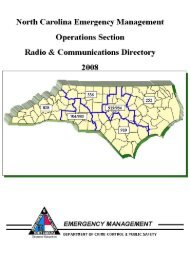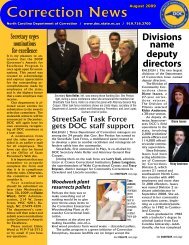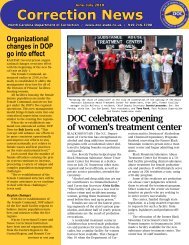Scene
October - North Carolina Department of Public Safety
October - North Carolina Department of Public Safety
You also want an ePaper? Increase the reach of your titles
YUMPU automatically turns print PDFs into web optimized ePapers that Google loves.
Stopping a cycle<br />
Mary N. Ward is Prisons’<br />
Family Services administrator<br />
and manages the domestic<br />
violence programs to ensure<br />
compliance with policy, standards<br />
and General Statutes.<br />
“We know that domestic<br />
violence has been on the rise,<br />
and recognize the many impacts<br />
that domestic violence<br />
has on everyone – individuals,<br />
families, children and the<br />
community. STOP and the<br />
Domestic Violence Education<br />
Program are evidenced-based<br />
programs, and Prisons makes<br />
every effort to ensure that<br />
inmates are afforded the opportunity<br />
to participate to<br />
receive the education and<br />
tools necessary to provide<br />
an avenue for change, be accountable,<br />
reduce future acts<br />
of violence, successful re-entry<br />
into society as law-abiding<br />
citizens, and to reduce<br />
recidivism.”<br />
Ward also recruits domestic<br />
violence facilitators and<br />
peer counselors. Her office<br />
selects the inmates to participate<br />
in the DVEP Program,<br />
and participants are those<br />
court-sanctioned/recommended,<br />
case manager-referred,<br />
self-referred, have a history of<br />
domestic violence, and those<br />
serving an active domestic<br />
violence sentence.<br />
Page 6 On the <strong>Scene</strong> October 2013<br />
Domestic from page 5<br />
Hands-on, hands off<br />
Whether offenders are on probation or<br />
have been incarcerated, the driving forces<br />
behind their domestic violence behavior are<br />
usually power and control. The programs<br />
that are found both inside and outside prison<br />
are designed to help the offenders understand<br />
and therefore alter their behavior.<br />
Just as she was a drum major in high<br />
school, leading the band and exhorting Morehead<br />
High School in Eden to greater glories<br />
on the field, Sarah Cobb now beats the drum<br />
as one of the chief proponents of DPS’s Domestic<br />
Violence Education Program.<br />
Cobb is the Piedmont Region program<br />
coordinator for prisons in Adult and Juvenile<br />
Facilities. She said the seven-year-old program<br />
is one of the few hands-on programs<br />
working directly with offenders while attempting<br />
to reach their hearts and minds<br />
with a simple, direct message: Hands off!<br />
Prisons operates two DVEP sites within<br />
the correctional system, Cobb said. Located<br />
at Brown Creek Correctional Institution and<br />
at Dan River Prison Work Farm, the fourweek<br />
education and awareness program was<br />
first begun in 2006 as a result of a 2005 legislative<br />
mandate for prison programs.<br />
The two-and-a-half-hour classes are designed<br />
to help male inmates learn to identify<br />
the factors that lead to abusive and aggressive behaviors,<br />
and equip them mentally with the basic skills designed to<br />
break the cycle of violence that often contributed to their<br />
incarceration. The classes’ primary entrants are offenders<br />
referred by the court or individual prison program case managers,<br />
and who have no more than six months remaining to<br />
serve on their prison terms.<br />
Program personnel who lead the class attempt to stem<br />
the tide of domestic violence by emphasizing the inmates’<br />
need to think before reacting to the often frustrating, confusing<br />
and sometimes volatile domestic situations they find<br />
themselves in once out on their own.<br />
The program’s maximum capacity is 720 inmates per<br />
year, and often includes “peer counselors,” inmates who<br />
have successfully completed the program.<br />
“A lot of times we think domestic violence is just physical,<br />
but it can be mental as we well,” Cobb said.<br />
Sarah Cobb, region program<br />
coordinator in Prisons’ Piedmont<br />
office in Kernersville.<br />
Photo by Paul Jefferson, correspondent.<br />
She was assistant superintendent for programs at Dan<br />
River when DVEP started.<br />
“It was a very exciting time for us,” she said. “We didn’t<br />
know where the curriculum would come from, or how it<br />
would be taught, but we knew it had to be educational and<br />
engaging, a real tool we could use, and it be useful to the<br />
inmates.”<br />
The DVEP educational model was developed outside<br />
Prisons sources, but was tailored for North Carolina<br />
based on national model programs on domestic violence prevention,<br />
Cobb said.<br />
“We get inmate referrals from across the state to participate<br />
in these programs, and some are court-ordered” as part<br />
of the offender’s sentencing guidelines, she said. All of the<br />
domestic violence programs operate through the Piedmont<br />
Region office.<br />
See Domestic on page 7















